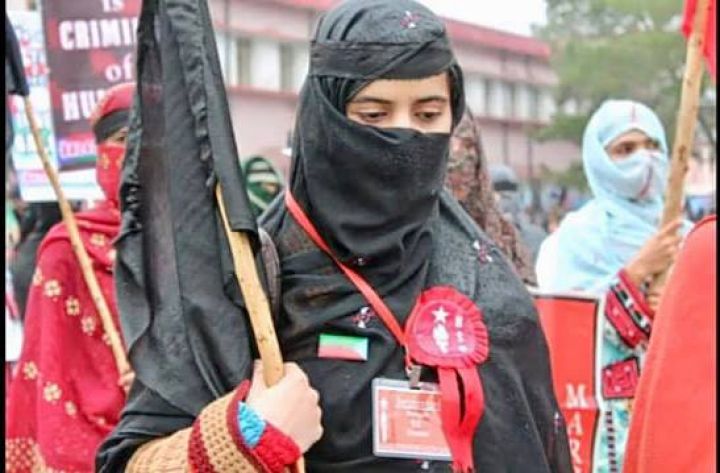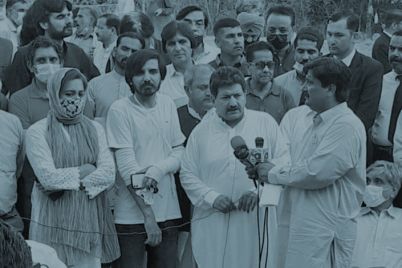The Pakistani military has tried to crush the Baloch national struggle with brute military force and enforced abductions. Unless the Pakistani military is made to end its policy of enforced abductions to serve its business interests, the Baloch resistance will continue to grow.
Arif Jamal
Three Chinese teachers and their driver near the Confucius Institute — a Chinese language learning center — in Karachi died when a burqa-clad woman detonated herself as their minivan passed by her. Immediately, after the suicide attack, the Baloch Liberation Army (BLA) claimed responsibility for the attack and identified the bomber as Shari Baloch, a teacher and a mother of two children. A BLA spokesman told CNN that Confucius Institute was targeted because it is a “symbol of Chinese economic, cultural and political expansionism.” In a statement to the press, BLA spokesman said that Shari Baloch joined the group two years ago and voluntarily signed up for self-sacrificing mission. The statement said, “Following Brigade’s established procedures, she was given time to revisit her decision… Six months ago she confirmed that she continues to stand by her decision of carrying out a self-sacrificing attack.” BLA has carried out three out of five suicide attacks in Pakistan in 2022.
According to Baloch social media accounts, Shari Baloch – alias Bramsh – was a schoolteacher in her native Kech district. She had a master’s in education and zoology from the University of Balochistan and M.Ph. from Allama Iqbal Open University. Her husband is a dentist. She came from a highly educated middle-class family. Her father had served as a director in a government office. One of her uncles is a retired professor, author, and human rights activist. As a student she was an active member of the Baloch Students Organization (BSO). Some analysts and commentators are puzzled by the first suicide attack by a woman in Pakistan. The suicide attack by a woman should not surprise us as women in Pakistani Baluchistan are highly politicized and lead the national rights movement. In the last 20 years, Baloch women have emerged as the face of Baloch national and human rights struggle as thousands of young Baloch men have been illegally forcibly abducted by the Pakistani military.
In a video, a BLA spokesman says that the motive of the attack was “a simple and clear message to China and Pakistan to withdraw immediately from Balochistan. This warning to China and Pakistan was also given by our leader, General Aslam Baloch. But China failed to pay heed. We once again make it clear [that] Gwadur and the rest of Balochistan belong to Baloch. It is our duty to protect our land and sea.” He says that BLA if fighting “to safeguard Balochistan from China, Pakistan, and other powers.” It is important to remember that because of its deep-water port in Gwadur, Balochistan is an important part of China’s Belt and Road network of infrastructure and energy projects that stretch to the Middle East. Addressing China directly, BLA spokesman says, “China! You came here without our consent, supported our enemy as Pakistani military is wiping our villages. But now it is our turn. Baloch Liberation Army guarantees you that CPEC will fail miserably on Baloch land… A special unit [of] Majeed Brigade has been formed particularly to attack Chinese officials and installations in Balochistan.” At the end, he addresses the Chinese president, “President Xi Jinping! You still have time to quit Balochistan or you will witness a retaliation from Baloch sons and daughters that you will never forget.”
The suicide attack once again reminds us that the nationalist movement in Pakistani Baluchistan is fundamentally a political struggle by the educated Baloch middle class who yearn to have the same human rights as people in civilized countries – or at least the same rights their Punjabi compatriots enjoy. These young and highly educated men and women are the thinking minds of the Baloch nation who feel they are occupied by Pakistan. It gives a lie to the officially- and ISPR-certified narrative that the greedy Baloch sardars are behind the Baloch national movement. Balochistan’s iconic nationalist leader Dr Allah Nazar also has an educated, middle-class background. Former Baloch National Movement (BNM) leader, Khalil Baloch, and recently elected BNM leader, Dr. Naseem Baloch, also come from middle class educated families. Baloch Students Organization (BSO), the vanguard of Baloch national struggle is also a middle-class group. Some of the Baloch sardars may have been attracted to the movement but the greedy Baloch sardars have always been siding the Pakistani military.
The Baloch national struggle is a political struggle that must be addressed politically by Pakistani politicians. Pakistani politicians – PPP, N League and PTI and others – have handed Balochistan over to the Pakistani military to run it. All the three major political parties – PPP, PML, and PTI – have promised in the past to address the question of enforced abductions but none of them could do. A few days ago, Prime minister Shahbaz Sharif expressed his helplessness when he vowed to raise his voice along with others and speak with the powers that be (ba-ikhtiyaar) to solve this issue. The Pakistani military has tried to crush the Baloch national struggle with brute military force. The most important weapon the Pakistani military is using is enforced abductions. The military started using enforced abductions in early 1970s – if not earlier. The enforced abduction of Asad Mengal – the son of Chief Minister late Chief Minister Ataullah Mengal and brother of Akhtar Mengal – was the first high profile enforced abduction. He was tortured and killed by Pakistan Army, and it is still not known where his body was dumped or buried. However, the Pakistan Army perfected the art of enforced abductions under General Pervez Musharraf. In the last 20 years, the military has enforced abducted thousands of innocent people in Balochistan – and thousands in Khyber Pakhtunkhwa – for demanding their constitutional human rights. Brutal military repression in Balochistan has been intensifying with the passage of time. Human right activist Sammi Deen Baloch writes in Dawn, “In the past, we used to receive mutilated and unidentified bodies and find mass graves of missing persons. Since 2018, the forcefully disappeared were either killed in staged encounters by the police’s counter terrorism department or buried without DNA identification as abandoned and unidentified bodies.” Unless the Pakistani military is made to end its policy of enforced abductions to serve its business interests, the Baloch resistance will continue to grow.
Follow us on Twitter @AlterVoices




